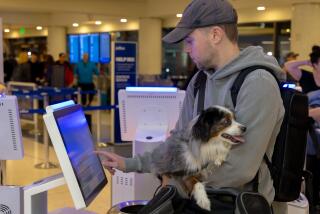Historic Khyber Pass May Reopen
- Share via
World Travel Watch is a monthly report designed to help you make informed judgments about travel throughout the world. Because conditions can change overnight, always make your own inquiries before you leave home. In the United States, contact the nearest passport agency office; abroad, check in with the nearest American Embassy .
Asia
--Afghanistan: The historic Khyber Pass into Pakistan, through which countless armies have passed, including Alexander the Great on his invasion of India, may reopen by February when the Soviet withdrawal is scheduled to be completed.
--Japan: Beginning Dec. 15 Americans who possess transit or return-trip tickets will be able to visit Japan for up to 90 days without a visa. The reciprocal arrangement is designed to facilitate the flow of travelers between the two countries, and to relieve consular officials of paper work.
--North Korea: The United States announced that it is easing restrictions on travel to and trade with North Korea. The policy change will make it possible for certain groups of Americans to visit that country, will allow the export of humanitarian goods to North Korea and will permit American officials to meet with North Korean officials in neutral settings. There is no change, however, in the lack of consular protection and services for American citizens. The U.S. government does not provide them.
Europe/Soviet Union:
--The Netherlands: Amsterdam’s legendary tolerance of “soft” drugs has gradually eroded, and the city is now less a countercultural haven than it was in the 1970s. Reduced welfare payments and a tight job market have motivated many to move away from drug use, and the trend is toward more traditional life styles. Street crime, however, is still high.
--Soviet Union: A lost or expired visa must be reported to the Soviet sponsoring agency immediately so a replacement can be issued in time for departure. Anyone having problems leaving the country should contact the American Embassy in Moscow, or the American Consulate in Leningrad.
Organized tours are often strenuous for elderly or frail people, and medical care does not meet Western standards.
In addition, unexpected bills can accrue from altered travel arrangements, including plane fares and hotel accommodations. Consider buying insurance to cover these contingencies. Intourist, the Soviet travel agency, has been known to absolve itself of all responsibility for sick travelers and abandon them to fend for themselves during and after their illness.
Central America:
--Guatemala: Travel to the major tourist areas is normal from a security standpoint, although road travel between cities at night is not recommended. Guerrilla activity occurs in the western part of the country, especially along the Mexican border and in the northern portions of El Quiche and Huehuetenango regions.
Avoid off-road travel in the highlands. When going to Lake Atitlan use the Los Encuentros Solola turnoff from the Pan American Highway and avoid the southern side of the lake. Street crime is high in the cities, especially in crowded markets. Use common-sense precautions.
--Haiti: Due to uncertain political conditions, avoid nonessential travel. Register with the American Embassy in Port-au-Prince upon arrival.
--Mexico: The Yucatan Peninsula resorts of Cancun, Cozumel and Isla Mujeres have almost recovered from Hurricane Gilbert. Services are expected to be back to normal by mid-December. Club Med Cancun plans to reopen Dec. 17.
--Nicaragua: Travelers should arrive by air at Sandino International Airport in Managua. Overland travel remains hazardous in many areas because occasional fighting still occurs despite the cease-fire between Nicaragua and the Contra forces. Land travel outside major cities is also dangerous because of land mines.
Avoid border areas and don’t travel at night. The only open border crossing with Honduras is at El Espino on the Pan American Highway. Travelers are urged not to try to enter Nicaragua by crossing the Gulf of Fonseca by ferry from El Salvador. Petty theft has increased, especially on Managua’s crowded buses. Credit cards and traveler’s checks are not accepted by most hotels. Carry enough cash.
Health
--Potable Water: Long used by backpackers as a guard against intestinal diseases, the Katadyn Pocket Water Filter will ensure travelers of potable water, regardless of how polluted it may be. The filter uses no chemicals and can treat a quart of water in 90 seconds. It’s available for $185 from REI Inc., P.O. Box 88126, Seattle, Wash. 98138. REI also sells another brand for $42.
More to Read
Sign up for The Wild
We’ll help you find the best places to hike, bike and run, as well as the perfect silent spots for meditation and yoga.
You may occasionally receive promotional content from the Los Angeles Times.






